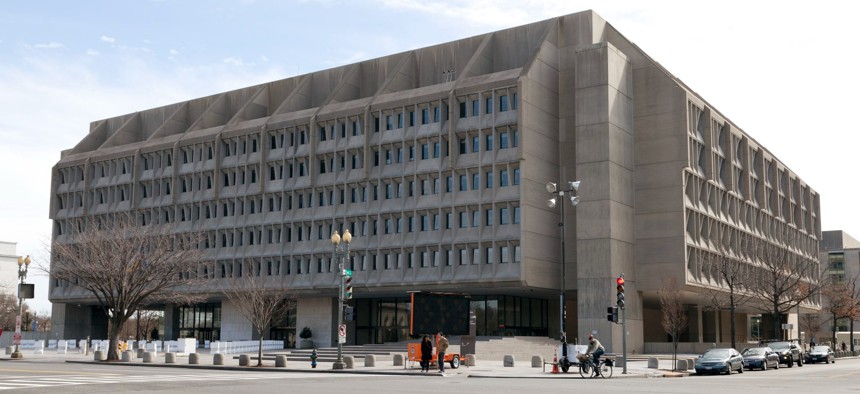
Headquarters of the Department of Health and Human Services in Washington, D.C. General Services Administration photo
Federal Call Center Workers Strike Over Pay, Healthcare Costs
Employees at Maximus call centers working on Centers for Medicare and Medicaid Services contracts, conducted a two-day strike this week seeking pay and better healthcare coverage.
Workers at Maximus, an IT services contractor that operates call centers for the Centers for Medicare and Medicaid Services, went on strike Monday and Tuesday of this week.
"We went on strike for a simple reason – a reason to demand better pay and affordable healthcare coverage. My family is hurting right now," said Yasming Johnson, who works at a call center in Hattiesburg, Mississippi, during a press call on Tuesday. "Everything is going up except for the pay."
Pickets took place in Hattiesburg and Bogalusa, La., both locations of Maximus call centers. Workers were also striking in Brownsville, Texas, Lawrence, Ky., Tampa, Fla. and Phoenix, Ariz., and over 100 participated in total.
The call centers aren't unionized but employees are working with the Communications Workers of America (CWA). Employees say that there isn't a union of Maximus workers already because of Maximus policies that discourage organizing.
There are about 10,000 Maximus agents working at 10 call centers spread over eight states, according to CWA. These employees handle calls about Medicare and the Affordable Care Act marketplace.
"It is shameful that we work for a federal contractor that grosses billions of dollars from the government… and it is also shameful that we help millions of Americans around the world and we don't have access to our own healthcare. We can't afford our own healthcare," said Johnson.
Maximus call center employees were paid as little as $10.60 an hour in early 2021, before Maximus increased wages after a Biden executive order instructing federal contractors to pay at least $15 an hour. The company has also cut deductibles for their healthcare plan from $4,500 to $2,500 last year, according to CWA.
Eileen Rivera, vice president of public relations and communications at Maximus, told FCW in a statement that the company "routinely meets with its employees to address various concerns and issues," citing an "open door" policy and anonymous hotline for employees, and that Maxmius has improved compensation, healthcare costs and the work environment since it got the contract for contact center operations in 2018.
"We respect our employees' legal right to attempt to organize, and any information we provide is designed to help them make an informed decision about union representation," she said.
Still, workers say that pay and healthcare costs need improvement, and that Maximus continues to discourage organizing with things like "anti-union" training for new hires.
Beatrice Berry, who also works at the Hattiesburg location, told reporters on Tuesday that she's worked at Maximus since 2014, getting trained in three different business lines, but still gets paid a new-hire wage at the company. She's previously had to take on a second job delivering newspapers.
Last year, call center workers at the company also filed a complaint with the Labor Department asking for revised pay rates after a report from the national advocacy organization, the National Employment Law Project, found that CMS lobbied the Labor Department to prevent pay increases for call center employees at Maximus more than once over a decade.
Organizers also point to commitments from the Biden administration on racial equity and worker organizing. The overwhelming majority of call center workers are women and people of color (in the Hattiesburg center, 90.7% of employees are people of color and 80.9% female, according to CWA), and organizers point to disparities in their pay as opposed to that of the CMS workforce.
"These workers are doing enormously important work for CMS and are entitled to decent wages, decent benefits and certainly the right to organize a union without employer harassment," said Sen. Bernie Sanders (I-Vt.) in a pre-recorded statement in the call. "Maximus has a federal contract worth over $5 billion, and the taxpayers of our country want to know that people who receive federal contracts like that treat their workers with respect and dignity."







